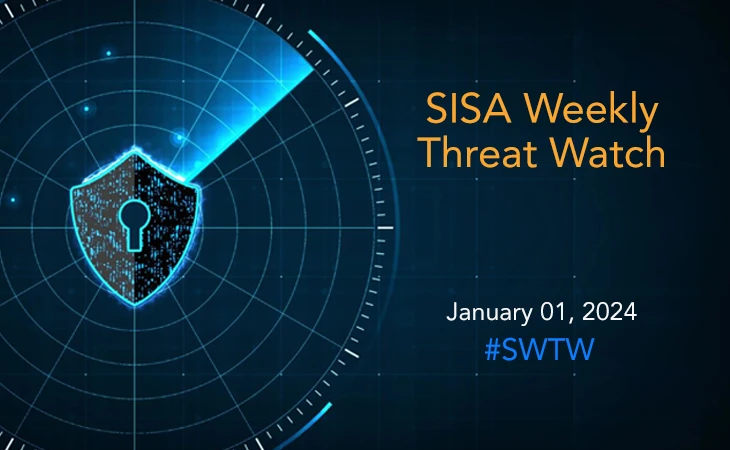Exclusive Insights
- The Critical Role of Managed Compliance in the Evolving Digital Payments Landscape
- The Rise of AI: A New Era in Cybersecurity Resilience
- Redefining Cybersecurity in a Fragmented Landscape: The Case for MXDR
- Cybersecurity Predictions and Trends for 2024
- Securing Tomorrow: Asia’s Digital Payment Transformation and the Road to 2024
- An American healthcare MNC strengthened its data security policy by integrating SISA Radar with DLP solutions
- SISA’s forensics-driven MDR solution helps Club Prophet improve monitoring of workloads on Google Cloud Platform
- SISA ProACT’s cloud-based MDR solution helps neobank improve real-time threat detection and response
- SISA helps a global cloud-based solutions provider mitigate IoT device vulnerabilities
Knowledge Lounge » The Critical Role of Managed Compliance in the Evolving Digital Payments Landscape
The Critical Role of Managed Compliance in the Evolving Digital Payments Landscape
Share on

In the digital payments industry, that’s rapidly evolving due to technological advancements and changing consumer demands, I’ve witnessed firsthand the complexities and challenges that come with the territory. This sector, in particular, has seen a remarkable transformation. Innovations have not only introduced new players into the market but also ushered in the era of digital currencies. These changes have significantly altered business models and consumer expectations, with customers now seeking faster, more cost-effective, and transparent payment solutions.
With this rapid expansion comes an increased responsibility to ensure consumer data privacy and security. Data breaches, once merely a potential risk, have become a frequent reality, carrying with them severe financial and reputational repercussions for companies and distressing consequences for consumers. This evolving landscape has understandably attracted heightened regulatory attention. Authorities are increasingly focused on protecting consumers, prompting a surge in the regulatory guidelines that businesses must navigate.
One of the most pressing challenges we face in this environment of heightened regulatory oversight, is the sheer volume and complexity of regulatory requirements. In-house compliance teams often find themselves at a disadvantage, as they must grapple with a diverse array of international laws and standards that can vary significantly across jurisdictions. This is not merely a logistical challenge—it’s a strategic one. Keeping up with continuous regulatory changes while trying to support business growth and innovation can stretch even the most capable teams.
The difficulties are compounded by the need for specialized knowledge. Each new regulation or technological innovation can require niche expertise that in-house teams may not possess. Building and maintaining an in-house compliance team can be expensive, especially for small to medium-sized enterprises. Recruiting and training staff to acquire this expertise is not only time-consuming but also costly. Moreover, the stakes are incredibly high; errors or delays in compliance can lead to significant financial penalties, legal repercussions, and damage to our reputation.
Another critical challenge is the technological infrastructure required to support effective compliance programs. The integration of compliance processes into the broader technological ecosystem of a company involves substantial capital investment and ongoing maintenance costs. For many, particularly small to medium-sized enterprises, these expenses can be prohibitive.
Furthermore, compliance isn’t just a matter of meeting external requirements. It’s about integrating these requirements into daily operations in a way that is both efficient and minimally disruptive. This integration often requires continuous audits, regular security assessments, and comprehensive reporting—all of which demand significant time and attention from in-house teams. The result can be a diversion of resources from core business activities, which could otherwise be used to foster innovation and growth.
In this context, the traditional approaches to compliance are proving insufficient. The dynamic nature of these regulations, coupled with the complexity and scope of managing compliance across various geographies, demands a more adaptive and efficient approach. This is where Managed Compliance comes into play.
Managed compliance is not just another business strategy; it’s a necessary evolution in the way companies handle regulatory requirements in the digital age. Managed compliance stands distinct from traditional compliance models primarily due to its unique delivery model, specialized expertise, scalability, and cost-effectiveness. Unlike the internal compliance functions that many organizations manage themselves, managed compliance is typically outsourced to specialized service providers. This outsourcing not only brings in a level of expertise that spans a wide range of regulatory frameworks but also ensures that compliance efforts are supported by the latest industry practices and insights.
Moreover, managed compliance is inherently scalable. It allows organizations to adjust their compliance programs based on fluctuating demands and evolving regulations. This flexibility is crucial in a landscape where regulatory requirements can change rapidly and unexpectedly.
From a financial perspective, managed compliance offers significant cost benefits. Organizations can select only the services they need from a broader managed compliance offering, allowing them to optimize their expenditures based on their specific needs. This a la carte approach, combined with the shared expertise and resources of the service provider, enables organizations to enjoy economies of scale and access to best practices that would be cost-prohibitive to develop in-house.
This approach guarantees that an organization’s compliance with statutory requirements is proactively managed, monitored, and upheld to mitigate risks related to non-compliance.
Why is Managed Compliance critical for businesses? GRAPHIC
- Risk Reduction: Managed compliance services help in identifying, assessing, and mitigating these risks effectively.
- Cost Efficiency: Outsourcing this as part of Managed compliance gives organisations access to the skill pool and also avail best practices and lessons learnt from the service provider.
- Focus on core business: The model enables organizations to free up bandwidth for an to focus on its core business.
- Adapting to changing regulations: Managed compliance services help stay abreast of the continuously evolving regulatory changes.
- Comprehensive compliance management: Managed compliance services typically offer a comprehensive suite of services that cover all aspects of compliance, from audits, assessments, implementation support, monitoring to reporting and advice.
At SISA, we recognize the nuances and pressures of the digital payments industry. Our managed compliance solutions are designed to alleviate the burdens of compliance for our clients across various regulatory standards be it GDPR, ISO 27001, SOX, PCIDSS, HIPPA etc. We offer a model that combines deep domain knowledge with advanced technology and AI. This approach not only ensures adherence to regulations but also enhances operational efficiency and mitigates risk.
Our services extend beyond mere compliance. They are about transforming compliance into a competitive advantage. By leveraging our forensic-driven insights and comprehensive management of the compliance process, we enable businesses to focus on their core operations without the constant worry of regulatory pitfalls. In addition, we allow organisations to cherry pick the services from the vast set of services offered as part of Managed Compliance offering. This shift not only protects them from potential fines and legal issues but also builds trust with customers and stakeholders—a crucial factor in today’s market.
In conclusion, as businesses continue to navigate the complexities of the digital payments landscape, the importance of a proactive and managed approach to compliance cannot be overstated. At SISA, we are committed to providing our clients with the expertise, tools, and services needed to turn compliance from a challenge into an opportunity.
Exclusive Insights
- The Critical Role of Managed Compliance in the Evolving Digital Payments Landscape
- The Rise of AI: A New Era in Cybersecurity Resilience
- Redefining Cybersecurity in a Fragmented Landscape: The Case for MXDR
- Cybersecurity Predictions and Trends for 2024
- Securing Tomorrow: Asia’s Digital Payment Transformation and the Road to 2024
- An American healthcare MNC strengthened its data security policy by integrating SISA Radar with DLP solutions
- SISA’s forensics-driven MDR solution helps Club Prophet improve monitoring of workloads on Google Cloud Platform
- SISA ProACT’s cloud-based MDR solution helps neobank improve real-time threat detection and response
- SISA helps a global cloud-based solutions provider mitigate IoT device vulnerabilities
 USA
USA India
India APAC
APAC Middle East
Middle East Rest of the Countries
Rest of the Countries

 Facebook
Facebook Linkedin
Linkedin  Youtube
Youtube






